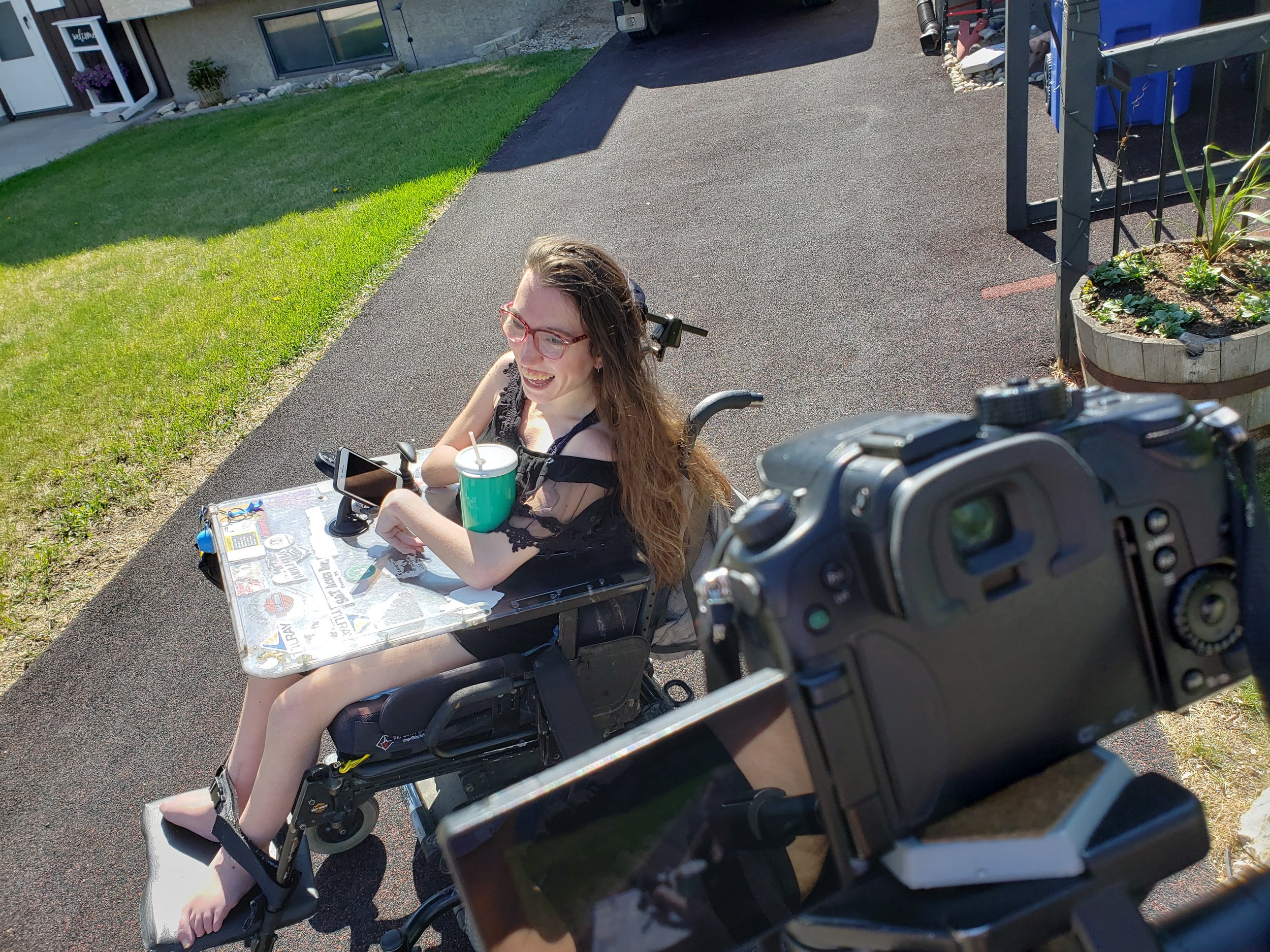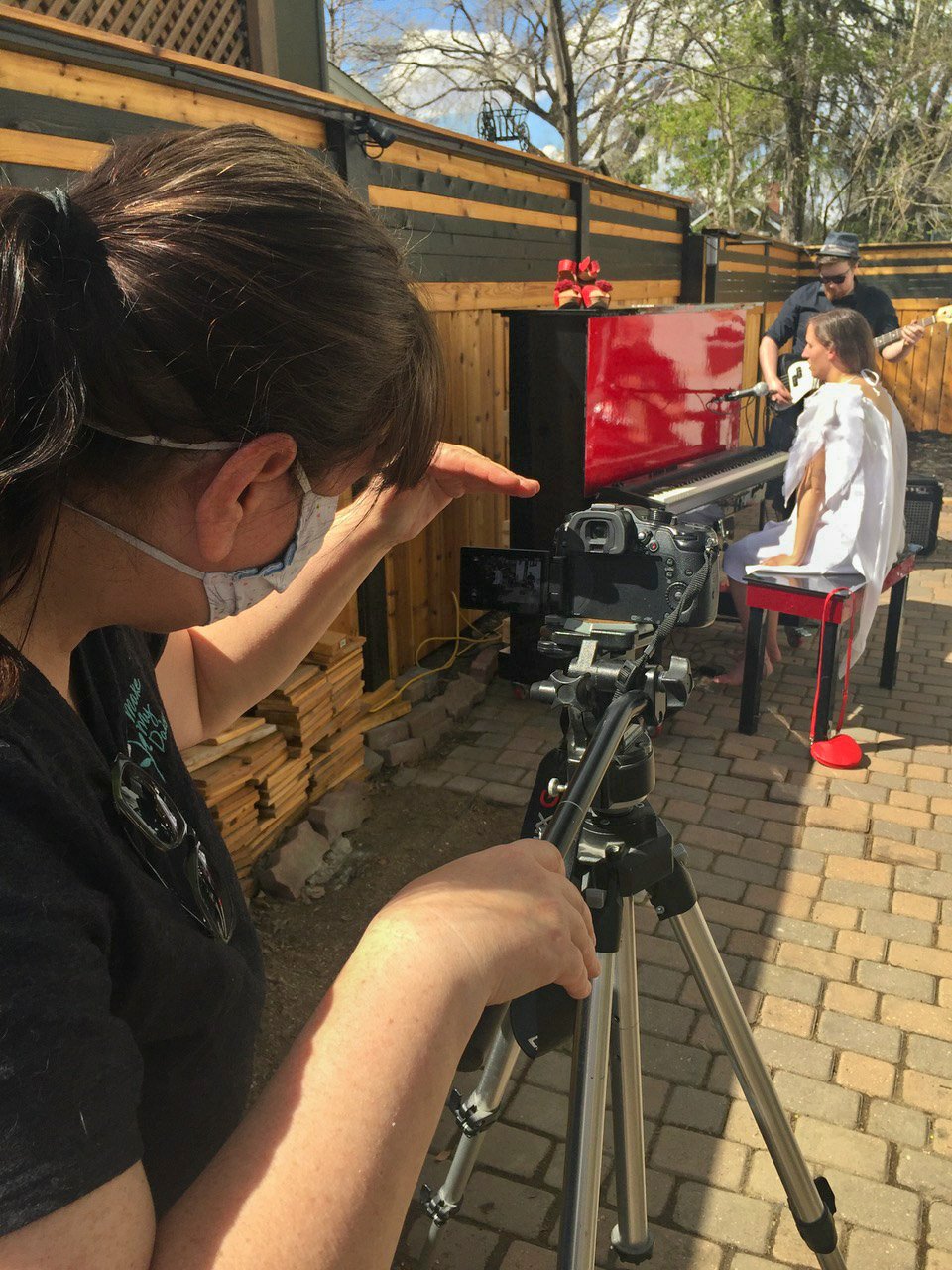Mine to Have
Performer Kelsey Culbert filmed by Dianne Ouellette. Photo: Dianne Ouellette
Regina theatre group Listen to Dis’ and filmmaker Dianne Ouellette interpret theatrical work for the screen
By Dianne Ouellette
In 2020, in the midst of COVID-19 lockdown and with no reopening of theatrical performances in sight, theatre artist Traci Foster and filmmaker Dianne Ouellette began a collaboration to bring Regina theatre company Listen to Dis’ production of Mine to Have to the screen. Ouellette talks with Foster, Listen to Dis’ Artistic Director and Founder, about the challenges and rewards of their collaboration.
How did the pandemic affect the theatrical production of Mine to Have?
We were on the last day of a six-week rehearsal and set to leave for a Saskatchewan tour when everything ground to a halt last spring – March 13th. What was first a delay became a rescheduling fiasco, and after our fourth rescheduling cancellation, a re-imagining of the project began. The pandemic presented a lot of uncertainty — and a lot of new opportunity. One of the joys of this pause from publicly relating has been new discoveries both as an organization and as artists. The challenges of the pandemic are many, but the learning we’ve had in terms of how to do digital theatre and the connections we’ve made are invaluable moving forward.
Dianne Ouellette films performers Ammanda Zelinski and Finn Burk. Photo by Traci Foster
What is it like to work with a filmmaker?
I am a very visual thinker, and so it’s often a beautiful conflict. How do I, as a director, give the filmmaker space while also knowing that our company has lived with some version of this show for the last four years? How do we create space to explore the new while embracing the familiar? Theatre is all about impermanence. Film, however, not so much. It has been about finding the essence of the internal landscape or emotional atmosphere of the message.
Does creating a digital production change the storytelling process?
In many ways, it does. But as (LTD actor) John Loeppky says: "I think digital production is akin to the difference between reading a play and performing a play". The theatre industry began the pandemic, hoping and praying for a swift return to live (events). Today, we are starting to see companies embrace the digital realm. That means that theatre artists are incorporating more film production styles and developing skills that are less present in a traditional theatre process. In short, that means we have found our way into a very fertile space, ripe with the opportunity to learn, explore, collaborate, and make art from a slightly different angle.
Does it open different possibilities for conveying story points, character development, and perspectives?
Yes, and it complicates the angle of the story. When I’m in an audience, if I don’t know the script, I only have the in-the-moment experience. The visual cues of the stage, the work of the actors, and the way the space feels are what is holding me. I am sharing a world that has been created for the sake of communal transformation — a very intimate shared experience. On film, I could be eating popcorn and sitting in my pyjamas, which I often am. And I’m not against sitting in my PJs in a theatre, but I think digital allows us to open up what our preconceived notions of style are in the theatre world, and part of that is embracing what’s different from the 'typical' experience that many of us hold dear.
How has the experience changed for you as a theatre director?
We have a saying in our company before we go on stage "act like it's the first time because, truly, it's the only time." What is a poof-and-it’s-gone moment in (live) theatre can live online forever (if it’s recorded). There is no 'poof' or impermanence there! For me, that requires a different framing, a different approach to set, different conversations with actors, a different eye.
How do you think the experience changed for the performers?
The actors had a blast. They enjoyed many aspects, including the attention paid to them on a one-on-one basis. I think the experience changed for the actors because many of them were – understandably – out of their element. Most, if not all, have been on camera before, but this was a radical reimagining of the project when compared to the original live performance plan. I think shifting to film stretched the company’s capacity to think outside of the typical theatre structure, and I’m extremely proud of them for how they handled that change and continue to do so. We are a very vocal company, and we know what we like and don’t like, which can make it difficult for other artists to come into.
Performer Natasha Urkow with Listen to Dis’ artistic director Traci Foster
What is most challenging about a collaboration like this?
Big question: The hardest thing about Dianne and Traci (film / theatre) is that we have different ways of finding the same thing, and at times, that proved to be utterly frustrating and exhausting. And in all fairness, this was a durational project with a very established collective vision tied to it that Dianne came into. The project (Listen to Dis) planned together could not happen because of lockdown, so everything was re-visioned very spontaneously. So, both of us were flying by the seats of our pants. That said, we laughed a lot and have consequently begun to understand each other’s working habits and communication styles, and we’re having a lot more fun in our collaboration today! We are finding our groove.
What is most rewarding about a collaboration between theatre & film?
In short, the creative collaboration and the journey within that. The end-product is fun and rewarding, but I think there is a different element of trust built when film and theatre mingle. It's like two people who haven't seen each other in a while. They kind of know what each other is up to, and they can figure out how to get along, but the first few minutes at the dinner table are an awkward dance. Finding our way into comfort while building that relationship and having additional perspectives and tools at our collective disposal is the most rewarding part for me.
Where there any surprises in the learning?
I was surprised at how accessible film can be when you build the experience around intimate access and inclusion, and you don't just throw that in as an afterthought or token response to our current calls to action.
Notes from Dianne Ouellette on the making of Mine to Have for the screen
My first degree was in Theatre, and I left it all behind for film. It's funny how it all comes back to you once you dive back in! When Foster approached me to work with her, I jumped on board right away. I was excited to work together in re-envisioning an inclusive theatre production as a short film and how this process would work.
I usually work alone. It's been rare in my film career to collaborate with other artists. Working with Foster and the performers has been a learning experience, full of challenges and rewards. I've always loved theatre actors and have used them in some of my films. I love how much broader the performers come across when filmed with their voices and gestures. Everyone was so great, willing to do what was needed with much enthusiasm to perform on camera and on cue, no matter how challenging or serious the shots.
Getting to know Foster, and the Listen to Dis' artists has been rewarding, and we've had a fantastic journey. Re-learning theatre has been fulfilling and has rekindled my passion! Foster is correct in stating there has been some frustration, but there have been a lot more laughs along the way! Trust me when I say a lot of laughs because as I was cutting together the footage there is much laughter in-between the seriousness of filming!
I know we've learned from each other coming from different artistic worlds and that a collaborative future is very bright!
Dianne Ouellette is a Métis filmmaker, multimedia artist, curator, communications specialist, and sessional instructor. She has a BA in Theatre (1993), BFA Film and Video (1995), and an MFA in Media Production (2020). She focuses her lens on family, history, and identity by sharing stories. Continuing to encourage others by creating media that connects and inspires people is valuable to her artistic goals.



